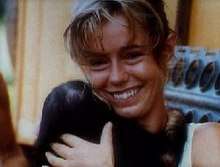Killing of Julie Ward
Julie Ward was a British woman who was killed in Kenya in September 1988. Ward died whilst on safari in the Masai Mara game reserve. The subsequent investigation into her death was notable for the campaign by her father, John Ward; firstly to persuade the Kenyan authorities to recognise that his daughter was murdered, and secondly to try to identify the killer or killers. Three people were charged with her murder, although none have been convicted.
Julie Ward | |
|---|---|
 Julie Ward, pictured in 1988 | |
| Born | 20 April 1960 |
| Died | c. 6 September 1988 |
| Known for | Victim of unsolved murder |
| Parent(s) | John and Jan Ward |
Death
Julie Ward was a publishing assistant and amateur wildlife photographer from Bury St Edmunds in England.[1] At the beginning of September 1988 Ward had been in Africa for 7 months photographing wildlife and was due to return to England in about a week.[2] She was travelling to the Masai Mara game reserve with an Australian friend, Dr. Glen Burns.[3] On 5 September 1988 the vehicle they were driving, a Suzuki jeep, broke down so Dr Burns returned to Nairobi and Ward spent the night alone at the Mara Serena lodge.[3] On 6 September the vehicle was repaired and Ward left to drive to the nearby Sand River camp to recover some camping equipment.[3] This was the last time she was seen alive.
Ward was reported missing and her father John Ward flew to Kenya to find his daughter.[4] He hired a plane to search the areas of the game reserve where his daughter was known to have camped alone.[4] A pilot sighted the Suzuki Jeep in a gulley next to a river and Mr Ward went to investigate in person.[4] Julie Ward's burned and dismembered body was found in the ashes of a fire by John Ward on 13 September.[5]
Investigation
The original theory put forth by the Kenyan officials was that Ward had been eaten by lions and struck by lightning, however they later accepted that she was murdered after her father's efforts uncovered further evidence.[6] The Kenyan coroner's report had been altered to disguise the fact that her bones had been cut by a sharp blade rather than gnawed by animals.[7] A British pathologist found that Ward had been dismembered with a machete then doused in petrol and set alight.[8]
John Ward, a retired hotelier, spent nearly £2 million on the investigation and made over 100 visits to Kenya.[1][5][9] He has accused the Kenyan government of former President Daniel arap Moi of trying to cover up Miss Ward's murder to prevent damage to the tourist industry.[10] A former MI6 agent has admitted having a role in the case.[11]
Subsequent events
In 1992, after the first of two trials, two junior park rangers were acquitted of her murder due to a lack of evidence.[6] The presiding judge in the trial recommended the investigation of the head park ranger.[2]
In 1997 the case was re examined by a fresh team of Kenyan police.[6]
In July 1998 Simon Ole Makallah, who was the chief park warden at the time of the murder, was arrested following a two year investigation.[2]
On 16 September 1999 Simon Ole Makallah was found not guilty at the second trial due to lack of evidence.[12][2]
In 2004 a British inquest, held at Ipswich, recorded a verdict of unlawful killing.[5]
In October 2009 the case was reopened after a secret visit, to Kenya, by John Yates, the head of the Metropolitan Police's anti-terrorism squad.[5] In December 2009 Valentine Ohuru Kodipo, a key witness of the murder, died.[13] Kodipo died in Denmark where he had lived in exile for more that 20 years. Ward's murder was so sensitive that Kodipo had fled Kenya following his testimony.[13]
in 2018 John Ward campaigned in the media for the authorities in Kenya to obtain a DNA sample from the person he suspected of the crime.[6]
See also
- List of unsolved murders
References
- Kennedy, Maev (13 April 2010). "Police reinvestigate Julie Ward murder in Kenya". the Guardian. Retrieved 8 September 2018.
- Nairobi, David Gough in (18 September 1999). "Kenyan judge clears ranger of Ward murder". the Guardian. Retrieved 8 September 2018.
- Alderson, Andrew (5 June 2004). "New witness: Julie Ward was gang raped then killed". The Telegraph. ISSN 0307-1235. Retrieved 8 September 2018.
- Press Association Staff (26 April 2004). "Father of Julie Ward relives the discovery of her body parts". The Times. ISSN 0140-0460. Retrieved 8 September 2018.
- Alderson, Andrew (10 October 2009). "Julie Ward murder case reopened". The Sunday Telegraph. Archived from the original on 13 October 2009. Retrieved 12 October 2009.
- Staff (6 September 2018). "Father wants DNA in 1988 murder case". BBC News. Retrieved 8 September 2018.
- McVeigh, Karen (3 January 2003). "New Kenyan government may re-open Julie Ward murder case". The Scotsman. Johnston Press Digital Publishing. Retrieved 9 February 2009.
- Alderson, Andrew (31 May 2008). "DNA breakthrough in Julie Ward murder". The Telegraph. ISSN 0307-1235. Retrieved 8 September 2018.
- Orr, James (11 October 2009). "Kenya agrees to reopen Julie Ward death case". The Guardian. Retrieved 25 October 2009.
- Staff (6 December 2006). "Fresh probe into Kenya murder urged". Metro. Associated Newspapers Limited. Retrieved 12 October 2009.
- Barkham, Patrick (30 April 2004). "MI6 agent hid role in Julie Ward murder case". The Guardian. Retrieved 10 August 2018.
- Pflanz, Mike (7 December 2006). "'Fresh evidence' in Julie Ward murder". Daily Telegraph. Retrieved 10 September 2018.
- Atsiaya, Peter (24 December 2009). "Key witness to Julie Ward's murder dies". The Stnadard. Kenya. Retrieved 9 October 2018.
Further reading
- Ward, John. The Animals Are Innocent – The Search for Julie's Killers (Headline 1991). ISBN 0-7472-3763-8
- Hiltzik, Michael A. (1991). A death in Kenya : the murder of Julie Ward. New York, N.Y.: Delacorte Press. ISBN 0-385-30191-X. LCCN 90027198.